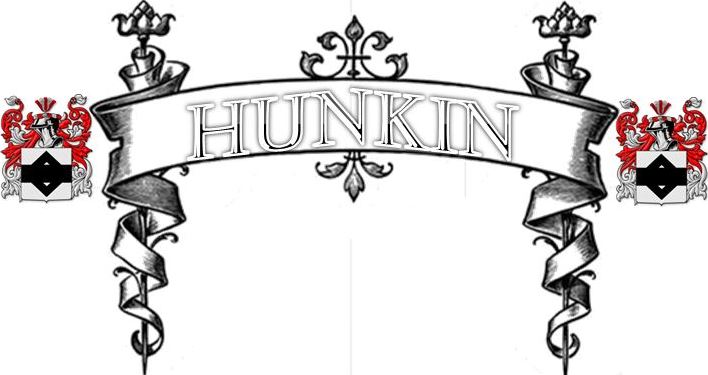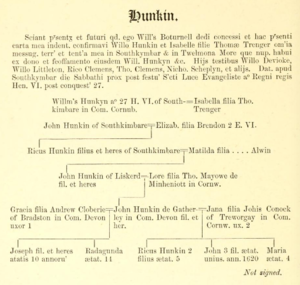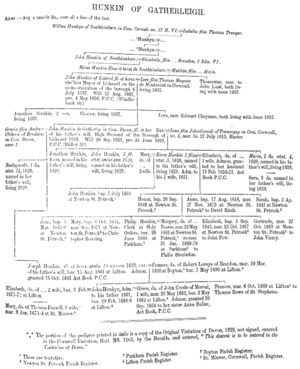- Profile
- Images
Location: [unknown]
Surnames/tags: Hunkin Hunkyn Hunckyn
The Surname Hunkin

|
Hunkin Early Origins
The surname Hunkin was first found in Cornwall where they held a family seat as Lords of the Manor of South Kimber. Cornwall was a land set apart, a land of mystique and quaint customs, more strongly related to Brittany and Wales than to England. It was not until the 10th century that they submitted to the Saxon rule of England. Since then, their influence has moved east into Devon, Somerset and Dorset.[2]
Hunkin Spelling Variations
Cornish surnames are characterized by a multitude of spelling variations. The frequent changes in surnames are due to the fact that the Old and Middle English languages lacked definite spelling rules. The official court languages, which were Latin and French, were also influential on the spelling of a surname. Since the spelling of surnames was rarely consistent in medieval times, and scribes and church officials recorded names as they sounded rather than adhering to any specific spelling rules, it was common to find the same individual referred to with different spellings of their surname in the ancient chronicles. Moreover, a large number of foreign names were brought into England, which accelerated and accentuated the alterations to the spelling of various surnames. Lastly, spelling variations often resulted from the linguistic differences between the people of Cornwall and the rest of England. The Cornish spoke a unique Brythonic Celtic language which was first recorded in written documents during the 10th century. However, they became increasingly Anglicized, and Cornish became extinct as a spoken language in 1777, although it has been revived by Cornish patriots in the modern era. The name has been spelled Hunkin, Hunkins, Hunkens, Unkins, Hunkyn, Hunkyns and others. [3]

|
- Login to request to the join the Trusted List so that you can edit and add images.
- Private Messages: Send a private message to the Profile Manager. (Best when privacy is an issue.)
- Public Comments: Login to post. (Best for messages specifically directed to those editing this profile. Limit 20 per day.)
- Public Q&A: These will appear above and in the Genealogist-to-Genealogist (G2G) Forum. (Best for anything directed to the wider genealogy community.)





